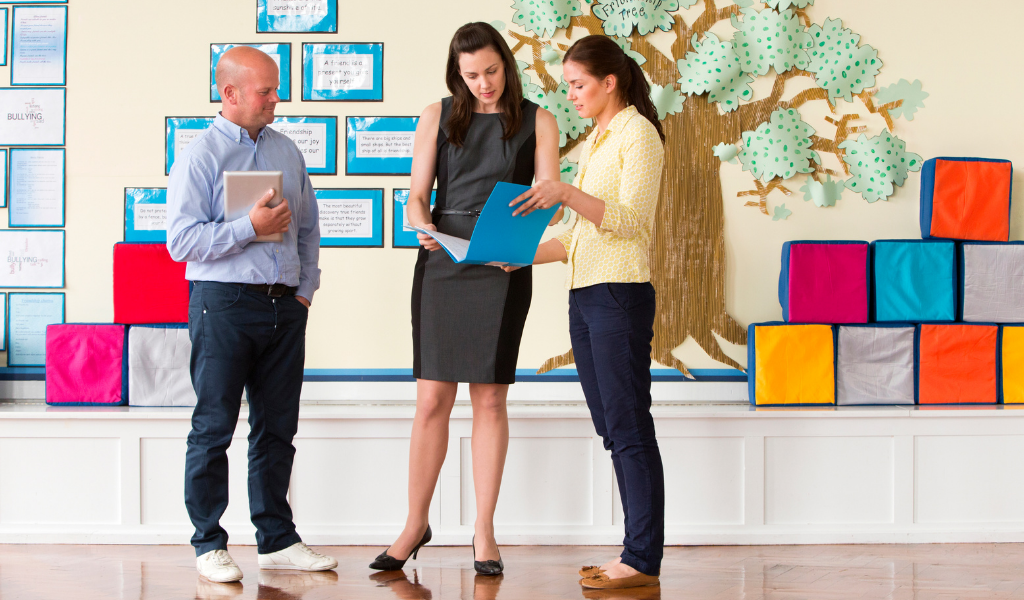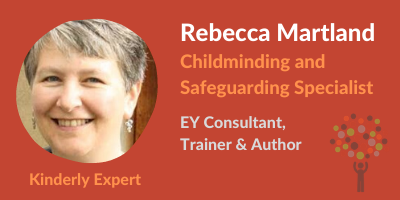Have you got an upcoming Ofsted inspection? In this article, four times ‘Outstanding’ childminder Rebecca Martland answers YOUR questions about how to sail through your inspection day!
For childminders, the inspection will last approximately 3 hours. For group provision operating for restricted daily hours, it will last around 4 hours and for group provision that’s open for a full day, it will last at least 6 hours.
Be welcoming! Smile and say hello!
Check the inspector’s ID (if you are unsure, you can contact Ofsted to confirm their identity) and ask them to sign in if you use an visitors’ book. A book is not a requirement but if you have one – make sure you use it!
If it is your normal procedure to remove shoes, then explain this to the inspector and show them where these can be stored. Offer hand sanitiser and show them where to put their coat and other belongings.
Managers in group settings may be able to have a private chat at this point to discuss the timetable for the inspection. If you are a childminder however, it’s likely that the children will need your attention, so deal with their needs first and introduce them to the inspector before trying to chat.

Yes of course, although most say no. However, make sure you follow your drinks policy and only offer a hot drink if this is your usual practice. Show you have risk assessed by telling the inspector where it is safe to place their cup.
First of all, this is not always a walk! If your setting is small, it may be a ‘sit’ instead. If your setting is large or your walk is disrupted by attending to children, it may be multiple walks!
In principle, a learning walk is a tour of your setting and your chance to show off what you do well and discuss your ideas for improvement. This is your opportunity to explain how you organise your provision and why.
When conducting the learning walk point out the areas you are proud of. Talk about any changes you’ve made and their impact, including changes due to coronavirus. Be prepared to discuss your curriculum: what you are intending children to be able to do or know, how your resources and activities support this and what children might be learning as a result.

The revised EYFS framework that came into force from September 2021 makes it very clear that the only paperwork required is that which is statutory, and this is the only paperwork an inspector will ask to see.
Any other paperwork, such as learning journals, is optional and inspectors will not ask to see it, but will look at it on request, if time allows.
Most of the evidence the inspector needs should come from discussions and observing the quality of the daily routines and activities of children and adults
Inspectors must check your DBS records (childminders who registered prior to the DBS system may have older checks such as a CRB, or police check. They do not need to obtain a DBS) and paediatric first-aid certificate/s
Inspectors will also check a sample of other records, which may include:
(See paragraph 58 & 59 of the Early Years Inspection Handbook for a more detailed list.)
Childminders are not required to have written policies for the EYFS but safeguarding and complaints policies must be in writing for the Childcare Register.

No – there is no longer a requirement to organise a planned activity. In group settings, and childminders who employ assistants, you will be invited to take part in a joint observation with the inspector of a member of staff during an activity or care routine. The inspector will want to talk to you about what is happening and why, what the child is learning and how you might build on this, the staff member’s effectiveness and quality of the interaction. Where childminders work alone the inspector will have a similar discussion after or whilst watching the childminder engaging with the children during their daily routines and activities.
Try to think ahead about how your environment will be organised on the day of the inspection. What resources and activities might be available and how do these fit with your curriculum intentions? How do they support children’s learning and reflect their current interests?
If you decide to plan a specific activity to be observed don’t do anything new. Choose an activity you know the children will enjoy and think how you might be able to extend itby adding additional resources or offering the children a challenge. Think about what new vocabulary you could introduce. Be ready to explain why you have chosen the activity.
The inspector will want to:
Make sure you and your staff know your children well and be ready to talk about their starting points, home learning environment, interests, where they are now and how you plan to support their learning. Make sure any staff are familiar with the setting’s policies and procedures, particularly safeguarding.
You can use your learning journals (if you do them) as prompts or to illustrate your comments, if you find that helpful.
Yes you can – as long as you ensure you continue to meet the requirements of the EYFS. The Early Years Inspection Handbook is clear that it is not the teaching method, but it’s effectiveness in ensuring children are kept safe and well and make good progress in their learning and development that is important.
There is no requirement to produce a written self-evaluation form but you can still complete one if you find it helpful.
The inspector will expect you to be able to talk about your evaluation of the quality of education and care you and any staff provide, including how well you meet the needs of the children, what you do well and what you want to improve and what plans you have in place for this
It may be helpful to have a note of any changes you have implemented and what training you have completed since your last inspection and the impact these have had on the children.
Before the inspector reviews their evidence, you should be asked if there is anything else you want to tell or show the them. This is also your opportunity to raise any concerns (if not done so already) around how the inspection has been conducted, including about the inspector’s behaviour. It is important that you are confident and do challenge the inspector if you are unhappy.
Once the inspector has prepared their judgements you will be invited for a final discussion. The inspector will talk through their findings and evidence to support the grade awarded for each of the 4 judgement areas (Quality of Education; Behaviour and Attitudes; Personal Development; Leadership and Management), including specific examples. They will then give you an Overall Effectiveness grade, which is your overall grade.
This is a provisional grade that must remain confidential until you receive your report. This is because your inspection evidence goes through a moderation process which occasionally results in a grade being changed.
The inspector will discuss their recommendations for improvement to be included in the report and any compliance actions that may be required. They should also advise you of the complaints procedure.

And remember, this is YOUR opportunity to show how good you are!

With over 20 years’ experience in the early years sector, Rebecca Martland is a qualified teacher and Early Years Professional. She is an early years trainer, consultant, author and 4-times Ofsted ‘outstanding’ registered childminder. Rebecca is a staunch advocate of play based, child-centred education and childcare, with a keen interest in supporting and enthusing others to share this philosophy.